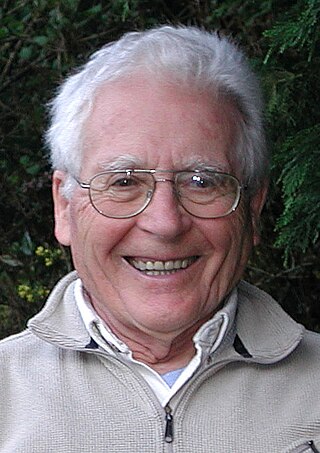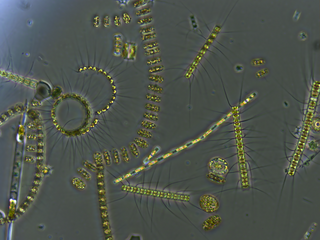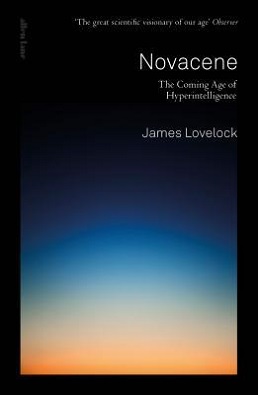Gaia philosophy is a broadly inclusive term for relating concepts about, humanity as an effect of the life of this planet.

James Ephraim Lovelock was an English independent scientist, environmentalist and futurist. He is best known for proposing the Gaia hypothesis, which postulates that the Earth functions as a self-regulating system.

Lynn Margulis was an American evolutionary biologist, and was the primary modern proponent for the significance of symbiosis in evolution. In particular, Margulis transformed and fundamentally framed current understanding of the evolution of cells with nuclei by proposing it to have been the result of symbiotic mergers of bacteria. Margulis was also the co-developer of the Gaia hypothesis with the British chemist James Lovelock, proposing that the Earth functions as a single self-regulating system, and was the principal defender and promulgator of the five kingdom classification of Robert Whittaker.
The Earth immune system is a controversial proposal, claimed to be a consequence of the Gaia hypothesis. The Gaia hypothesis holds that the entire earth may be considered a single organism (Gaia). As a self-maintaining organism, Earth would have an immune system of some sort in order to maintain its health.

In progress

A superorganism, or supraorganism, is a group of synergetically-interacting organisms of the same species. A community of synergetically-interacting organisms of different species is called a holobiont.

The Gaia hypothesis, also known as the Gaia theory, Gaia paradigm, or the Gaia principle, proposes that living organisms interact with their inorganic surroundings on Earth to form a synergistic and self-regulating, complex system that helps to maintain and perpetuate the conditions for life on the planet.

Biogeochemistry is the scientific discipline that involves the study of the chemical, physical, geological, and biological processes and reactions that govern the composition of the natural environment. In particular, biogeochemistry is the study of biogeochemical cycles, the cycles of chemical elements such as carbon and nitrogen, and their interactions with and incorporation into living things transported through earth scale biological systems in space and time. The field focuses on chemical cycles which are either driven by or influence biological activity. Particular emphasis is placed on the study of carbon, nitrogen, oxygen, sulfur, iron, and phosphorus cycles. Biogeochemistry is a systems science closely related to systems ecology.

In planetary astronomy and astrobiology, the Rare Earth hypothesis argues that the origin of life and the evolution of biological complexity, such as sexually reproducing, multicellular organisms on Earth, and subsequently human intelligence, required an improbable combination of astrophysical and geological events and circumstances. According to the hypothesis, complex extraterrestrial life is an improbable phenomenon and likely to be rare throughout the universe as a whole. The term "Rare Earth" originates from Rare Earth: Why Complex Life Is Uncommon in the Universe (2000), a book by Peter Ward, a geologist and paleontologist, and Donald E. Brownlee, an astronomer and astrobiologist, both faculty members at the University of Washington.

Mary Beatrice Midgley was a British philosopher. A senior lecturer in philosophy at Newcastle University, she was known for her work on science, ethics and animal rights. She wrote her first book, Beast and Man (1978), when she was in her late fifties, and went on to write over 15 more, including Animals and Why They Matter (1983), Wickedness (1984), The Ethical Primate (1994), Evolution as a Religion (1985), and Science as Salvation (1992). She was awarded honorary doctorates by Durham and Newcastle universities. Her autobiography, The Owl of Minerva, was published in 2005.

Gaianism is an earth-centered philosophical, holistic, and spiritual belief that shares expressions with earth religions and paganism while not identifying exclusively with any specific one. The term describes a philosophy and ethical worldview which, though not necessarily religious, implies a transpersonal devotion to earth as a superorganism. Practitioners of Gaianism are called Gaians.
Homeorhesis, derived from the Greek for "similar flow", is a concept encompassing dynamical systems which return to a trajectory, as opposed to systems which return to a particular state, which is termed homeostasis.

Planetary habitability is the measure of a planet's or a natural satellite's potential to develop and maintain environments hospitable to life. Life may be generated directly on a planet or satellite endogenously or be transferred to it from another body, through a hypothetical process known as panspermia. Environments do not need to contain life to be considered habitable nor are accepted habitable zones (HZ) the only areas in which life might arise.

Tyler Volk is Professor Emeritus of Environmental Studies and Biology at New York University.
Nathan Currier is an American composer.

The CLAW hypothesis proposes a negative feedback loop that operates between ocean ecosystems and the Earth's climate. The hypothesis specifically proposes that particular phytoplankton that produce dimethyl sulfide are responsive to variations in climate forcing, and that these responses act to stabilise the temperature of the Earth's atmosphere. The CLAW hypothesis was originally proposed by Robert Jay Charlson, James Lovelock, Meinrat Andreae and Stephen G. Warren, and takes its acronym from the first letter of their surnames.
Andrew James Watson FRS is a British marine and atmospheric scientist and an expert in processes affecting atmospheric carbon dioxide and oxygen concentrations. He was formerly a Professor of biogeochemistry in the School of Environmental Sciences at the University of East Anglia, in 2013 he moved to a position as Professor at the College of Life and Environmental Sciences at the University of Exeter.

Living systems are life forms treated as a system. They are said to be open self-organizing and said to interact with their environment. These systems are maintained by flows of information, energy and matter. Multiple theories of living systems have been proposed. Such theories attempt to map general principles for how all living systems work.
The balance of nature, also known as ecological balance, is a theory that proposes that ecological systems are usually in a stable equilibrium or homeostasis, which is to say that a small change will be corrected by some negative feedback that will bring the parameter back to its original "point of balance" with the rest of the system. The balance is sometimes depicted as easily disturbed and delicate, while other times it is inversely portrayed as powerful enough to correct any imbalances by itself. The concept has been described as "normative", as well as teleological, as it makes a claim about how nature should be: nature is balanced because "it is supposed to be balanced". The theory has been employed to describe how populations depend on each other, for example in predator-prey systems, or relationships between herbivores and their food source. It is also sometimes applied to the relationship between the Earth's ecosystem, the composition of the atmosphere, and weather.

Novacene: The Coming Age of Hyperintelligence is a 2019 non-fiction book by scientist and environmentalist James Lovelock. It has been published by Penguin Books/Allen Lane in the UK, and republished by the MIT Press. The book was co-authored by journalist Bryan Appleyard. It predicts that a benevolent eco-friendly artificial superintelligence will someday become the dominant lifeform on the planet and argues humanity is on the brink of a new era: the Novacene.













